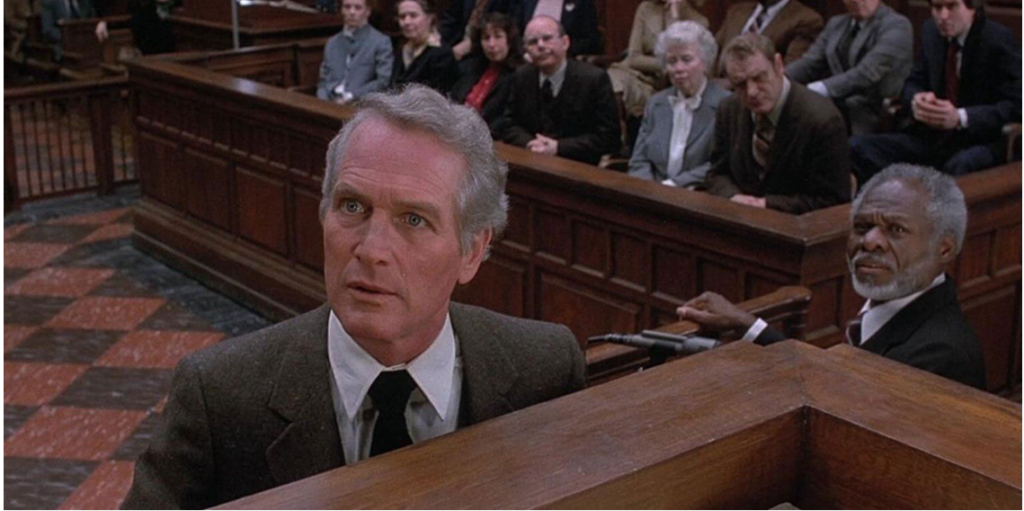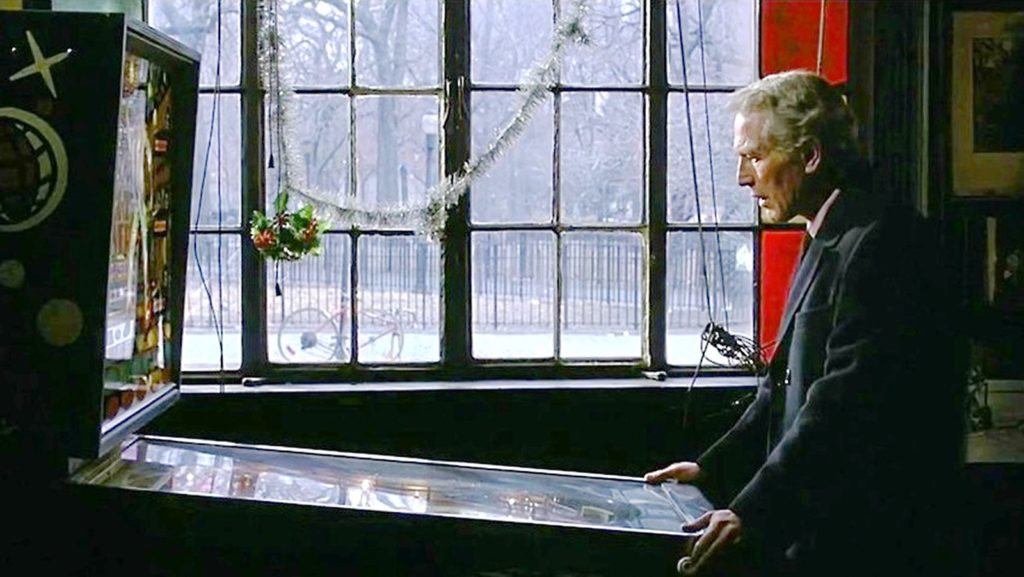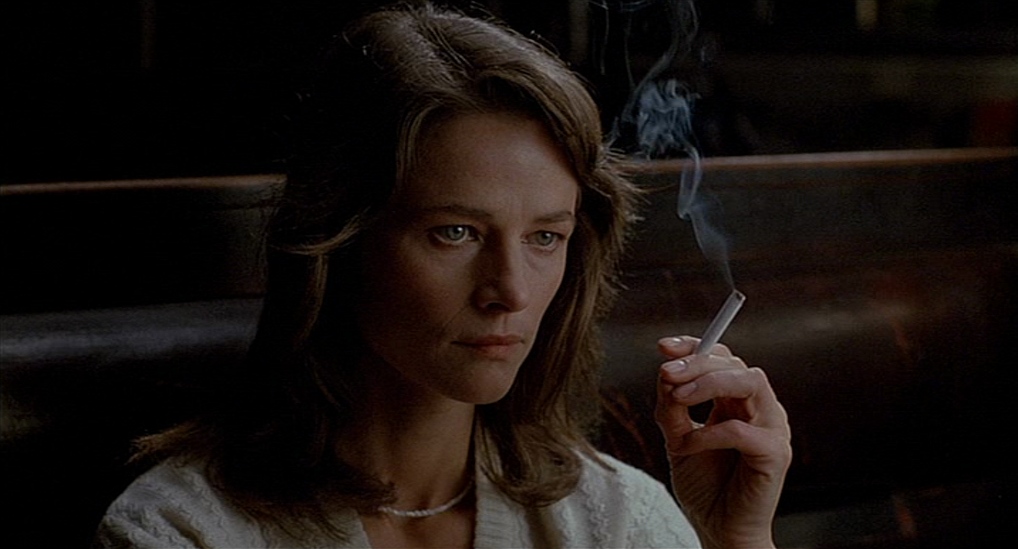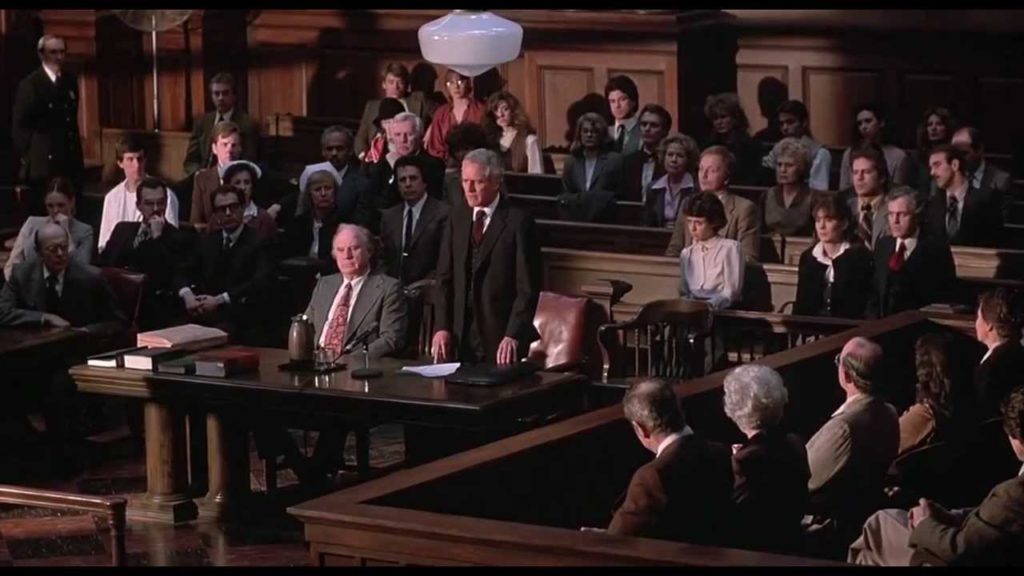| MH Rowe |

The Verdict plays at the Trylon Cinema from Sunday, May 26th through Tuesday, May 28th. Visit trylon.org for tickets and more information.
As quiet and downbeat as it is—as suspicious of institutional authority as it is—The Verdict (1982) is not quite the post-Watergate courtroom drama it appears to be. It traffics instead in a variety of chastened heroism, the kind that comes from finding out that democratic institutions, like courtrooms and juries, have some juice in them yet. A fantasy, perhaps, but an uncynical one in this case. It’s like Spotlight (2015) if Spotlight had been a New Hollywood art film.
Directed by Sidney Lumet and written by David Mamet, The Verdict tells the tale of a paradigmatic “ambulance chaser,” Frank Galvin (Paul Newman). His delirium tremens is so bad he goes down to his shot glass like a hummingbird, not wanting to slop it on the table with his trembling hand. Frank roves Boston bribing managers at funeral homes so he can enter during a service and politely prey on the bereaved, hoping to represent them in a wrongful death suit. He seems half-dead himself, despite Newman’s handsome composure. He even loses at pinball, which he stoically plays with a mug or shot glass as his only companion, standing in the corner at his regular dive.

If the film ultimately sounds a heroic note, its mood remains boozily post-Nixon and very 1970s. The vibe is unemployment; love seems hard to come by; there is nearly no musical score. The walls of Frank’s rooms and offices are grimy, stained. The infrastructure suggests neglect and decay, the end of postwar American prosperity. It’s morning in America, after all. You’re left with the impression that brown, red, grey, and navy blue are the only colors in Boston.
Since Frank is so pathetically down on his luck, his friend, Mickey (Jack Warden), brings him a case he can win. A woman named Deborah Ann Kaye was admitted to St. Catherine Laboure Hospital in Boston to deliver a baby. She was given an anesthetic that caused her to vomit in the mask and choke. Deprived of oxygen for several minutes, she suffered permanent damage to her brain. Now comatose, she lives on a ventilator. Her sister, Sally (Roxanne Hart), and her sister’s husband, Kevin (James Handy), have finally given up and can no longer afford, emotionally and financially, to support Deborah. They want to sue the hospital so they can pay for Deborah’s permanent care in a long-term facility while they move west, to Tucson, Arizona. Their dream is American, with a medical twist. Sally and Kevin want to disentangle themselves from all that the case represents—their little New England nightmare of depressive caretaking and permanent austerity, with no means at their disposal. As Frank tells himself and Mickey much later in the film, repeating it like a mantra, “There are no other cases; this is the case.” A case that suggests, I think, everything: the confinements of the world at large, Boston, the East Coast, the Church, hospital wards, the possibility of justice and freedom, the possibility of dignity weighed against the likelihood of self-disgust.
Though Frank plans to take the settlement money offered by the hospital’s church representatives, he balks. The testimony of an independent-minded doctor and Frank’s own visits to Deborah’s bedside prick at his miserable, alcoholic conscience. When he turns down the offer of $210k, he tells the bishop he’d be “lost” if he took it, nothing but a “rich ambulance chaser.” His conversion to the cause isn’t so unselfish, really. He devotes himself to it because the case looks like a restorative for his poorly preserved ideals.
At this dramatically precise moment in Frank’s life, as his conscience rises to the occasion of a contest in court, he meets Laura Fischer (Charlotte Rampling). Over dinner and drinks, he expounds to her his philosophy of legal dispute. “The court doesn’t exist to give [the weak] justice,” he says, “the court exists to give them a chance at justice.” Injustice is our universal condition, he implies, but the jury is the thing. In Frank’s imagining, juries “want to believe—all of them, all their lives think ‘It’s a sham; it’s rigged; you can’t fight city hall’ but when they step into that jury box… I think you just barely see it in their eyes. Maybe.” Laura asks, “Maybe what?” Frank looks off, imagining perhaps a horde of jurors, who could be anyone, any American. “Maybe I could do something right,” he says. Frank’s theory of justice is that people really want to remake the world in the name of what’s right. Perhaps a scary thought; certainly, an American one.
Anyway, as with ethics, so with sex. Or so it seems. Laura and Frank have an amusing moment of foreplay in his apartment and spend the night together. The film seems intent to suggest that Frank is becoming a man again in more ways than one.

Things aren’t so smoothly affirmative, however. For one thing, Rampling’s American accent may have a slight wobble or uncertainty, but she’s an incredible foil for Newman. His equal in striking personal beauty, Rampling has a sharkish glance and glint in her eye. She thrives on sudden turns: affection to anger, as when she reproaches Frank for his indulgence of self-pity, or happiness to despair, as when Frank learns of her betrayal and, after a wordless exchange of feelings, he knocks her to the floor. It is to the film’s credit that Newman plays out the ugly anger that Frank keeps at bay.
The Verdict isn’t in the end about Boston so much as it is about what Boston represents: the urban East Coast, the aging, even sclerotic and patrician customs of well-heeled American power, which is here comforted and cosseted by institutions associated more with the Old World, like the Catholic Church and its affiliate hospitals, than any new one. And what American institutions show up in this film anyway? For one, there’s the telephone company, whose mail to a customer and nurse Frank steals to discover the whereabouts of a crucial witness. There’s also the magazine Professional Nurse Quarterly. Frank poses as a representative of the magazine’s “subscriptions department” to cannily locate the key witness when he calls her. The bars in the film also feel American, in their democratic sociability, with Frank as the well-dressed if downwardly mobile attorney trading sexual jokes with apparently working-class bar flies. Americans united by their peculiar and convivial drinking problems. Everything a trade or a sale, a deal or a con. And what could be more American than the informal network of a commercially minded private lawyer like Mickey, who brings Frank the case in the first place? Mickey comments to Laura, when he tells her about the bad old days, when Frank was crushed to learn of jury bribing at his former firm, “he figured anyone who knew what a spinnaker was had to be a saint.” A sail specific to a yacht, the spinnaker suggests the seductive power of those people who, no matter their democratic ideals or sense of justice are, in fact, long-established American aristocrats. That’s the East Coast—jealous of its power and institutional confidence—and Frank fell for it long ago.

Not quite noir and not quite courtroom drama, The Verdict nevertheless offers a riveting court scene as its finale. Perhaps the casting is the best part of the film, for here it’s an aged James Mason as the expert and ruthless patrician defense attorney, Ed Concannon. Mason brings something ferocious to his part, a man devoted above all to the job of “paying for” his office, his clothes, the pro bono work his firm does—in other words: the world as it is, not as it could be. He too is an excellent foil for Newman.
Despite the disgust Frank feels when he believes he has lost the case, his stirring and sentimental closing argument, like an old-fashioned Hollywood monologue, achieves the just verdict for which hadn’t dared to hope. In the film’s only concession to a giddy sense of right and wrong, the jury even asks if they can reward more money than Galvin had sought. The ending does feel like a concession, I think, as if the film’s producers just couldn’t stand to conclude the film as it seemed destined to end. But Frank’s speech praises the democratic promise of the jury and the law as embodied in a verdict. “You are the law,” he insists. He appends a Biblical flourish—“act as if ye have faith, and faith will be given to you”—to stress the opportunity these jurors have not to rely on justice but to make it. Although, if there is justice to be found, it has little future for its advocates. When Laura calls Frank drunk from her hotel room, after the case, Frank won’t pick up the phone. According to the rules of dramatic telepathy, he knows it’s her and has nothing to say. Her betrayal has allowed Laura to reenter Ed Concannon’s patrician world of money, good works, and smooth operators. Frank won’t go back, though. His destiny is more purgatorial. He’s stuck on the East Coast forever.
Edited by Olga Tchepikova-Treon
